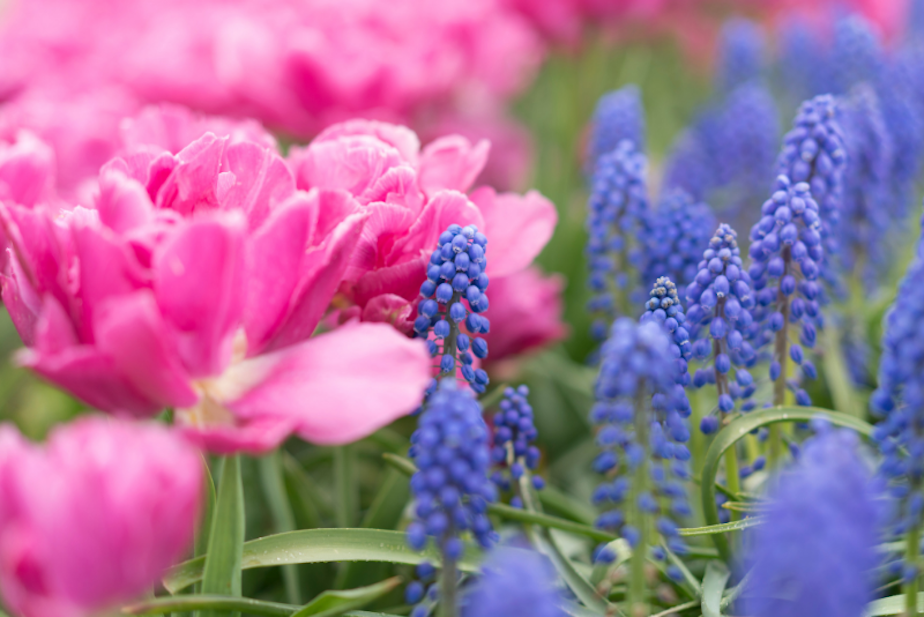Northwest spring gardening tips, with Ciscoe Morris

Spring has arrived in western Washington. That's evident with the sun, wind, and rain that all arrive in the same day. But with Thursday, March 7 hitting above 70 degrees — the warmest day so far — nature is sending Northwest gardeners the message that it's time to start planting.
But you may be looking out at those raised beds and wondering: "What the heck am I supposed to do with these?" Northwest gardening expert Ciscoe Morris is here to help.
Ciscoe tells KUOW's Soundside that the past year has been tough on gardeners and their plants.
"Boy, last summer, we had that heat dome that just beat the tweedle out of so many plants. And then we follow with one of the coldest winters we've had for a long time," he explained. "Even plants that normally just fly right through with all those extremes, some of them bit the dust."
But plants are hardy, and many are now making their return. Taking questions from the KUOW newsroom and our listeners, Ciscoe offered some advice on how to get your garden looking lovely this summer.
- Prune your shrubs! If you want them looking nice for next year, you've got to get going on pruning as soon as your rhododendron or camellia finishes blooming. "After they're done blooming, they put out new growth. And then after a while that new growth forms the bud that's going to bloom next spring. The time to prune is right when those flowers fade, before that new growth starts."
- It's not too late to plant your spring greens! Right now (early April) is the perfect time to plant lettuce, radishes, peas, all your favorite spring vegetables. "All these vegetables can actually germinate in soil that's just a little above 45 degrees." So get yourself a soil thermometer and plant those seeds or starts.
- Now also is a great time to aerate your lawn. A lot of homeowners make the mistake of putting down grass seed on the surface of their lawn and it doesn't take because of the "thatch on the ground," a layer of dead roots, stems, etc. He recommends renting an aerator, but with a caveat, based on personal experience: "Just remember, these aerator machines are real monsters."
- Outsmarting those pesky rabbits. Raised beds (2.5 to 3 feet high) will likely eliminate the rabbit problem, but won't protect your garden from deer. Ciscoe said he had heard good things about an animal repellent called "Plantskydd," but he had not tried it himself. "It's dried pig blood, but people swear by this stuff," he said.
- For people who are removing cover crops and planting vegetable gardens, Ciscoe recommended cutting the tops off the cover plants, but tilling in the roots, as those release nitrogen and other nutrients that will reduce the need for fertilizer. "You don't want your cover crop to go to seed. Or you'll have that coming up all over your garden."
- When it comes to cherry trees or other fruit trees that stop producing, Ciscoe had several theories. The most likely cause is a lack of bees to cross pollinate the tree. He said, especially with a cherry tree, it could be that a neighbor cut down their cheery tree, which eliminated the cross pollinator. He suggested renting mason bees or buying a dwarf cherry tree that blossoms at the same time as the non-producing tree to reignite the cross-pollinating possibilities.
- How to eliminate dandelions? Try white vinegar. Ciscoe recommends using a sprayer, but also attaching a funnel on the end to direct the spray because straight white vinegar will kill dandelions, but also any grass around it that gets sprayed. He also advised a thorough soaking, not just a light spray. As he put it, "You have to squirt the tweedle out of it."
- If you're worried about when the rain dwindles this summer, invest in some drought tolerant varieties. Rosemary is a particularly good plant that can handle dry conditions, and when it blooms in the winter the hummingbirds love it!
- Finally, remember we live in a great place for planting. You don't need to worry too much about heat zones for your garden. You can grow plants that typically like a colder climate here in Seattle. Just be careful with anything that likes it hotter. They tend not to do as well.





